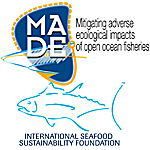Outcomes of the French program aiming at a widespread use of "non-entangling FADs"
* : Corresponding author
Since August 2010, the French tuna purse seiners operating in the Indian Ocean have deployed more than 1000 modified FADs to be non-entangling. The work done by the crews with the help of IRD scientists also involved in the MADE program, resulted in the identification of three designs of FADs, which present characteristics that allow to reduce or even eliminate the risk of entanglement of turtles and sharks and are widely accepted by the crews without significantly increasing the manufacturing cost of these FADs.
The catch data collected on these non-entangling FADs have shown that the yields do not appear to be altered by the changes of the FAD design.
A small number of entanglements observed in these first generation "non-entangling FADs" suggests, however, that the efforts made by the boatowners should be continued. The discussion of these results therefore also relates to the responses proposed by the sector in order to achieve the goal of zero entanglement in a sustainable and economically viable manner.
The catch data collected on these non-entangling FADs have shown that the yields do not appear to be altered by the changes of the FAD design.
A small number of entanglements observed in these first generation "non-entangling FADs" suggests, however, that the efforts made by the boatowners should be continued. The discussion of these results therefore also relates to the responses proposed by the sector in order to achieve the goal of zero entanglement in a sustainable and economically viable manner.
- Presentation

 PDF version
PDF version
